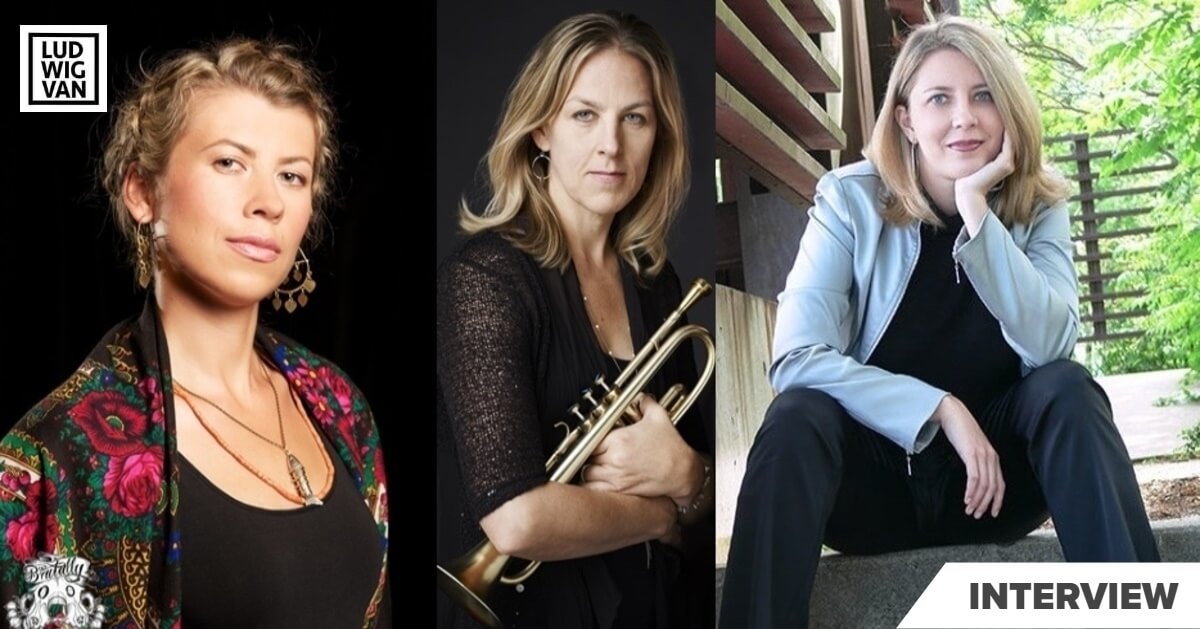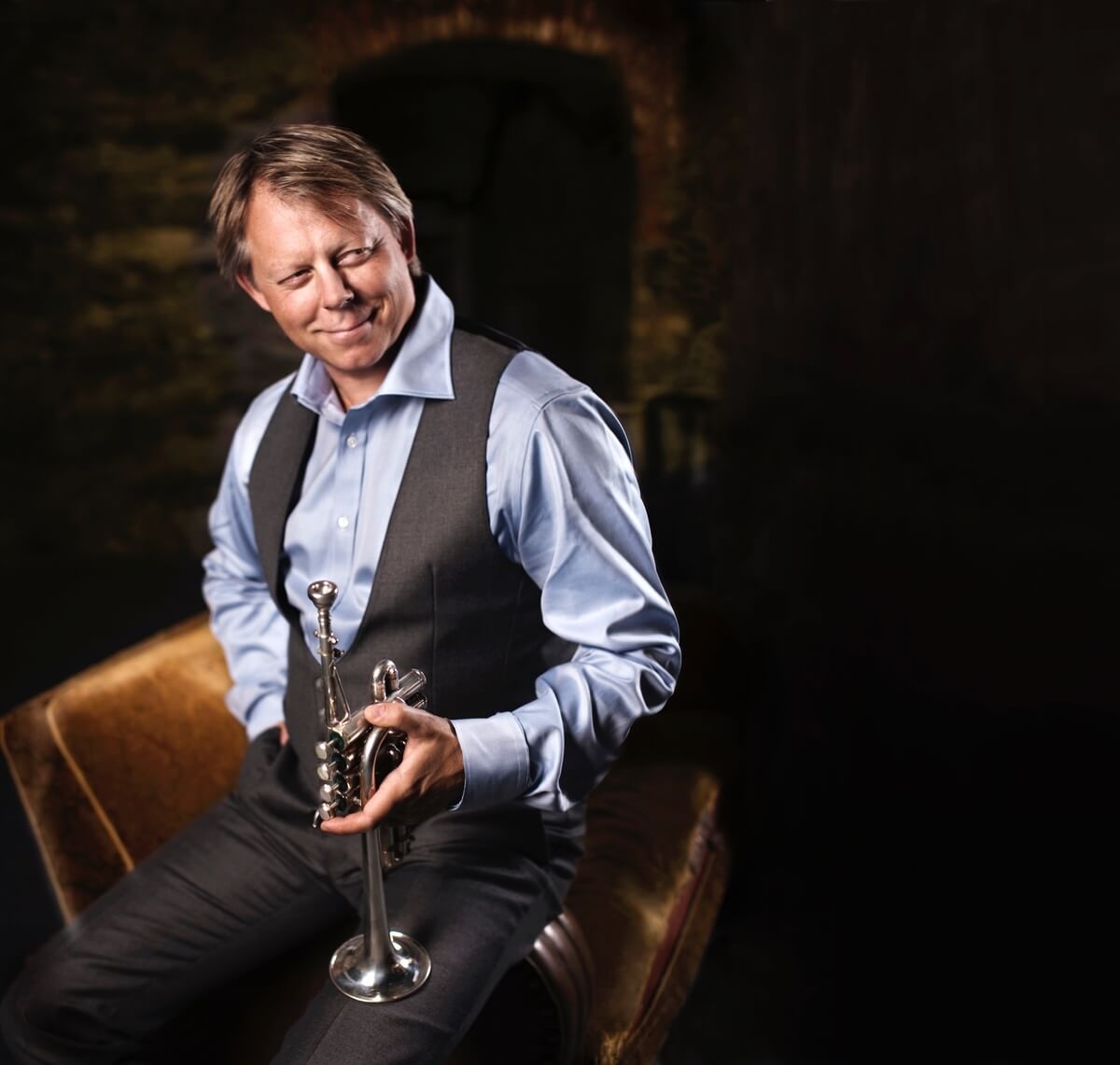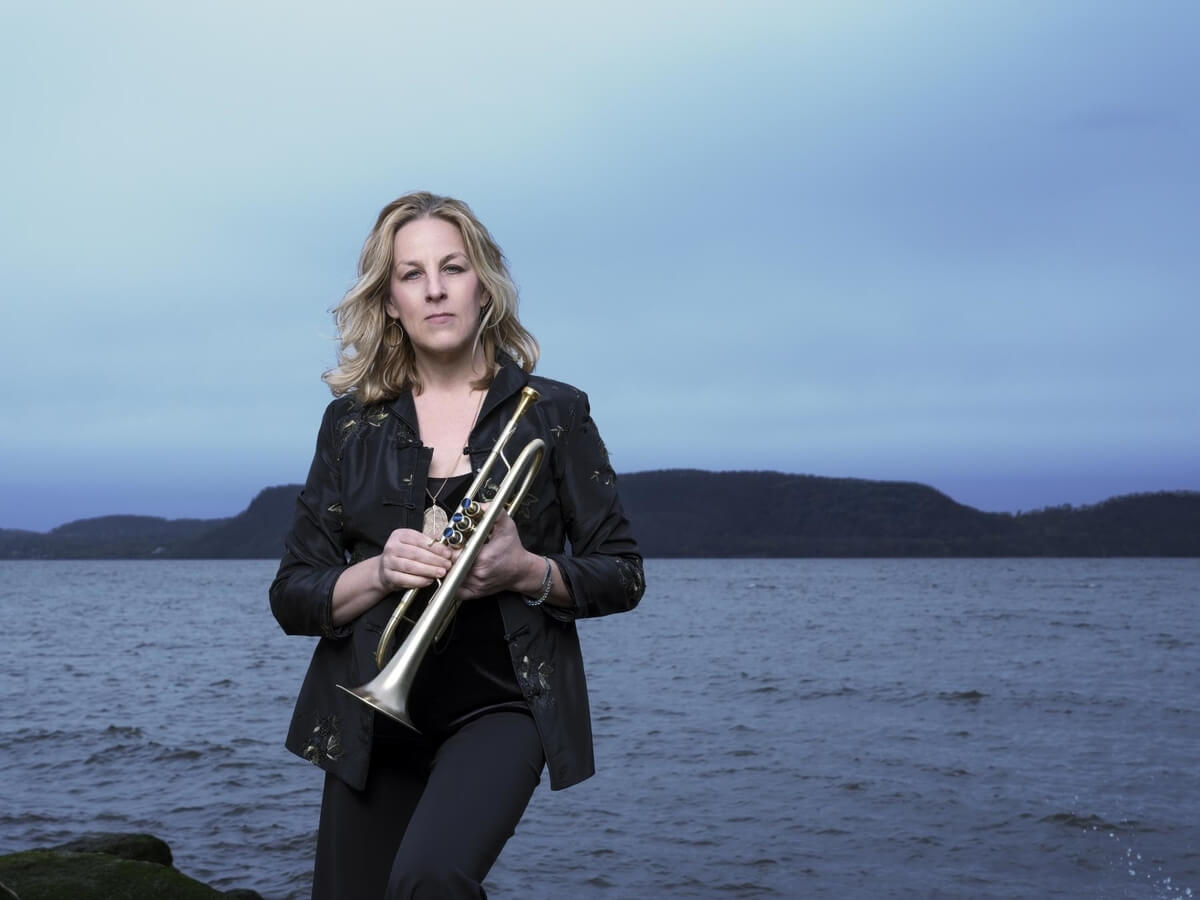Soundstreams’ ‘Top Brass’ brings top notch soloists and fresh works for the trumpet, including three new works no one’s heard yet to the stage.

Trumpet declares. It prompts and signals. And on October 3, 2019, the trumpet(s) shall sound, at the Soundstreams 2019-20 opener: Top Brass. Three virtuosos: Ole Edvard Antonsen, Jens Lindemann and Ingrid Jensen, will gather to create a complex portrait of the trumpet, from the familiar golden Baroque of the past, to the present and its parallel world of macabre. And in contrast to the traditionally male-dominated world of brass, (which is slowly changing), here are fresh views from the three essential women of Top Brass — Anna Pidgorna, Heather Schmidt, and Ingrid Jensen.
Anna Pidgorna had a proper maelstrom of a journey while composing The Three Woes. Lawrence Cherney, Soundstreams’ artistic director, expressed interest in further exploration within Anna’s work, adding dramatic elements: musicians moving and utilizing different points in space. Anna said yes. “I really ran with this idea. There is quite a bit of moving around, and I had to write the music in such a way that all this could be executed while still giving the piece a satisfying musical form.” Not being in Toronto posed an unusual challenge. “Since I don’t live in Toronto, and couldn’t go to the hall, I had to guesstimate how long it might take people to get from the different points in the hall. I hope those timings will work!”
Anna had free rein for the commission, with simple restrictions: it had to be for three trumpets and string orchestra, and 8-10 minutes in length. Such freedom in the commission process is a welcome thing for a composer. “This is one of the things I really appreciate about working with Soundstreams,” she says. “They commission me because they like what I do, and they ask me to write for them when my interests happen to align with their ideas. They trust me to make the artistic choices that make the most sense for me based on what I’m interested in at the moment.”
For The Three Woes, she ended up choosing climate change. And the Book of Revelation. In the Revelation — the most colourful and violent book of the Bible — seven trumpets bring in world-ending catastrophes, as they herald the final judgment; most life on earth will be wiped out clean, so that the chosen few can be admitted to the new paradise on Earth. The last three of these seven are known as The Three Woes.
Ironically, Anna initially picked Revelation because it was not a personal matter: objective ideas are often much easier to mold, where working on personal matter can bend you instead. “In a way, this piece was very easy for me to write because it was a lot less personal than my music usually is. I wasn’t drowning in my own emotions while I did this as I often do. I was not raised religious at all so the Book of Revelation is fictitious mythology to me. I was having fun exploring these ridiculously creative horrors that the prophesy promised. The piece was fairly abstract from an emotional point of view for a while.”
However, like the rising sea level and fatal heat waves, climate change slowly and surely seeped into her mind, and it became inevitable — a prophecy coming to life, work, and her own consciousness. “Once I started reading about the prophesy, I was struck by the fact that a lot of what it describes is either already happening or is likely to happen as the effects of climate change worsen,” she says.

The thing that I was thinking about the most when processing the end of the world prophesy was this idea that after all this carnage and the natural disasters that will wipe out most of humanity and basically destroy the earth, the people that are deemed worthy of living in the Kingdom of Christ are supposed to now build paradise,” Anna says. “How will they be able to rejoice and live in happiness after witnessing all this, after watching most of their loved ones die? Or will their memories be erased as they enter paradise? And who is going to clean up the earth to turn it into paradise? I was really fascinated by this idea of a triumphant heralding of the arrival of paradise amidst all this destruction. There is a cognitive dissonance there. Similarly, there are people who choose to ignore what’s happening with the climate and the catastrophes that are sure to come. I think some of them think that being rich will somehow keep them safe. But even if they can buy their way to islands of safety, how will they be able to enjoy their lives with all this destruction around them? This is what I was thinking about when creating the dramatic arc for the piece, this cognitive dissonance of paradise amidst destruction.”
It is curious what The Three Woes might conjure for the audience — music without words often expresses without specifics. Sad music is often set as happy music — as good music can simply evoke emotion without any other help; it’s our own contextual experiences and interests that determine what it means. There will be program notes. There are pre-show discussions. But being so deeply immersed in its creation, what’s Anna’s expectation?
“From an artistic point of view, it’s really not essential for people to know about the climate change connection,” she explains. “It’s more like, ‘Oh, by the way, what the prophesy is describing is eerily similar to what’s going on now. Let’s ponder this while we are here.’ I can’t really control the conversation about this piece though, because whatever I may have intended, I have to release it into the world and let it have its own life.”
The peppered jollity of (possible) terror continues in the program, especially in Ligeti’s Mysteries of the Macabre. This selection of three arias from the opera, Le Grand Macabre, became wildly popular thanks to Toronto favourite Barbara Hannigan’s “Gepopo” — she’s been singing it to international acclaim for the last ten years, and in Top Brass, we will get to hear the version for trumpet and piano, featuring Jens Lindemann and Heather Schmidt. It’ll be a busy night for Heather — in addition to the amazing absurdity of the Mysteries, she’s also in André Jolivet’s Concertino for Trumpet, String Orchestra and Piano, which has a terrific piano solo part, and features as the composer of Titanomachy.
“Jens Lindemann the trumpet soloist approached me about the project, and I was immediately interested, since although we are very familiar with each other’s work, we had never worked together before. We are both Canadians from Alberta, (me from Calgary, Jens from Edmonton), and we both currently live in Los Angeles,” says Heather.
Drawing from the popular Shostakovich piano concerto, where piano and trumpet work together like a double concerto, Heather zooms in to the idea. “The concept of two soloists seemed to lend itself to the idea of a battle between the two instruments,” she says. “I mentioned the battle idea to Kim Turney, (this piece is dedicated to her), and she specifically suggested Titanomachy. I immediately loved the idea and thought that this instrumentation would be a fun way to represent this concept. I’m always interested in Greek mythology and have written other works inspired by this area.”
The Greek poem draws from a ten-year battle between the Titans and Olympians, and in Heather’s version, the two factions, trumpet (Jens is featured soloist) and piano, will lock horns for supremacy, with plenty of colouristic fun.
“I’ve written a lot of orchestral music, so I’ve frequently written for brass within an orchestra, but I haven’t written as much chamber music for brass, and never a concerto-style soloist part for trumpet, so this has been a fun project for me,” she says. “I did meet with Jens to discuss some specific trumpet idioms, and the two specific ideas that came out of that conversation and made it into the piece are: first, the idea of the trumpet playing into the open piano strings with the damper pedal down, which causes the piano strings to resonate even though the piano isn’t being played, (this happens at the opening of the piece), and secondly, Jens also had the idea of switching between different trumpets, so he actually plays three different trumpets in the course of the piece — trumpet in C, flugelhorn and piccolo trumpet.”

Ingrid Jensen, the 2019 recipient of Jazz Journalists Trumpeter-of-the-Year, is excited to be joining this diverse program. Mainly known for her jazz work as both performer and teacher, (she is currently on faculty at both Purchase College and the Manhattan School of Music), Ingrid grew up on the Canadian west coast, her childhood filled with music. “I grew up with a mom who played amazing classical piano,” she recalls. “In her 30s, she discovered stride and jazz piano, and continued to fill our childhood ears with amazing music, from Chopin to Debussy, to Oscar Peterson and more. I wanted to play the trombone, but ended up on a trumpet.”
Soon, Ingrid went out to the world with her horn, and she has been playing and exploring ever since, including milestone projects such as the Maria Schneider Orchestra, and Artemis. “The challenge of the instrument led me around the world to play and study with every style of teacher and player that made themselves available for me.” And so Ingrid was delighted to accept Jens’ invitation for Top Brass, as she finds everything about the project exciting. She will get to step out of her very jazz-and-improvised world into a more organized and orchestrated classical setting.
For Top Brass, Ingrid will be performing as part of the trumpet trio, and is the feature soloist for Allan Gilliland’s lush Stranger on the Prairie. Being a true chamber musician, Ingrid’s very interested in how the three big personalities will influence and merge in such a varied program.
“They are all very different pieces, and I am learning from all of them as I practice and study the scores, and am definitely challenged as well. We won’t know until rehearsal exactly how things will unfold — I can’t wait to play them live and see how the resonance of the sound connects with everything around me in Toronto! I’m expecting a very deep creative process to unfold in rehearsals, as we find the correct musical spacing for all three trumpet players… I’m very excited to hear how all three of us blend and phrase together.”
The rest of the program will feature a few familiar classics, including the radiant Concerto for 3 Trumpets by Telemann, and works by R. Murray Schafer and Takemitsu, and a third world premiere (in a single concert!), Brian Current’s Serenade for Three Trumpets. The brilliant trumpeters will receive additional support from a 15-member string orchestra led by Joaquin Valdepeñas, and from lovely jazz musicians Robi Botos on piano, and Mike Downes on bass.
It’s easy to continue to live in the past, whether it be a trumpet as a herald in the old days of kings and queens, or towering men playing trumpet with sweat dripping down their faces. It’s been a good long while since Louis Armstrong, Miles and Dizzy died, yet it still takes a bit of time for the general public to name a trumpet player other than those three — maybe Chris Botti and Alison Balsom will get a mention. Yet the trumpet, the instrument, remains such a familiar thing, and Top Brass promises so much — top notch soloists and fresh works for the trumpet, including three new works no one’s heard yet (how often does that happen today, where everything is shared instantaneously, and globally?) Get your tickets and come with excitement. You will find new things.
Soundstreams present: Top Brass, 8pm on 03 October 2019, at Trinity St. Paul’s Centre, Toronto. Details here.
#LUDWIGVAN
Want more updates on classical music and opera news and reviews? Follow us on Facebook, Instagram or Twitter for all the latest.
- CRITIC’S PICKS | Classical Music Events You Absolutely Need To See This Week: April 22 – April 28 - April 22, 2024
- CRITIC’S PICKS | Classical Music Events You Absolutely Need To See This Week: April 15 – April 21 - April 15, 2024
- SCRUTINY | Laurie Anderson Entrances A Sold-Out Koerner Hall With A Journey Down The Rabbit Hole - April 8, 2024



